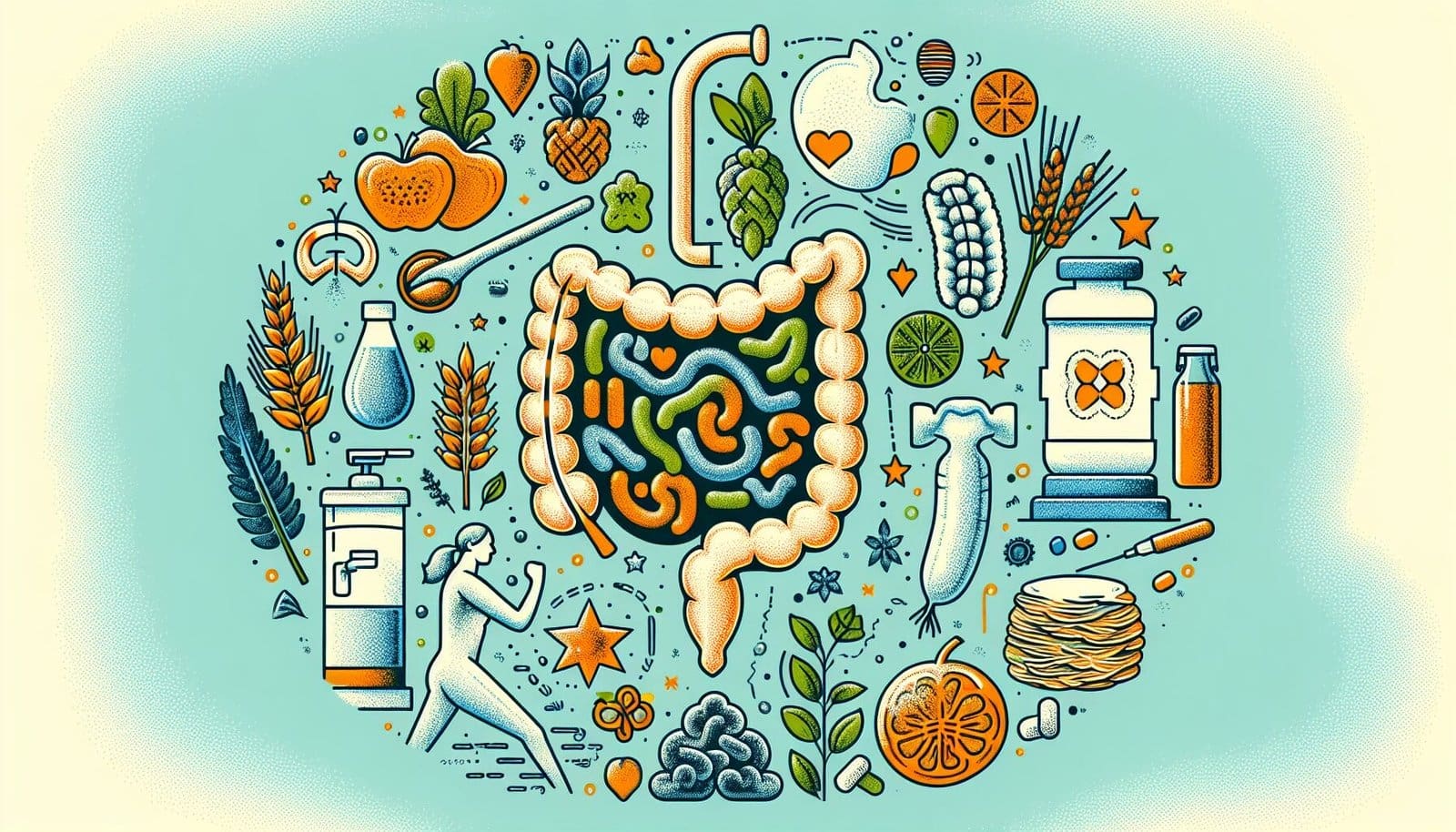Are you ready to give your gut health a much-needed boost? Look no further than a whole-body detox program designed to nourish and restore your gut flora. By focusing on cleansing your entire body, this program targets the root causes of gut imbalances and promotes a healthy microbiome. With expert guidance and a holistic approach, you'll discover the multitude of benefits that come from taking care of your gut. Say goodbye to digestive issues and hello to improved overall well-being with this transformative program.
Understanding Gut Flora and Its Importance
What is gut flora?
Gut flora, also known as gut microbiota, refers to the complex community of microorganisms that live in your digestive system, primarily in your intestines. These microorganisms, including bacteria, viruses, and fungi, play a crucial role in maintaining your overall health and well-being. In fact, you have trillions of microorganisms residing in your gut, consisting of hundreds of different species.
The role of gut flora in overall health
The gut flora is involved in various physiological processes that are essential for your health. They help in the digestion and absorption of nutrients, synthesize essential vitamins and compounds, regulate immune response, and assist in the breakdown of complex carbohydrates that your body cannot digest on its own.
Furthermore, a healthy gut flora acts as a protective barrier against harmful pathogens and prevents their overgrowth. It also helps to maintain a balanced pH level in the gut, supports bowel regularity, and improves metabolic function. Research suggests that an imbalanced or disrupted gut flora may contribute to the development of various health conditions, including inflammatory bowel disease, allergies, obesity, and mental health disorders.
How imbalances in gut flora can affect health
When there is an imbalance in the gut flora, known as dysbiosis, it can have detrimental effects on your health. Dysbiosis can occur due to various factors, such as poor diet, stress, antibiotics, and certain medications. Some common symptoms of gut flora imbalances include digestive issues like bloating, gas, and diarrhea, as well as weakened immunity, mood disturbances, and skin problems.
Imbalances in the gut flora have been linked to an increased risk of developing chronic diseases, including autoimmune disorders, cardiovascular diseases, and even certain cancers. Therefore, maintaining a healthy and diverse gut flora is crucial for your overall well-being.
Introduction to Whole-Body Detox Programs
What is a whole-body detox program?
A whole-body detox program refers to a holistic approach aimed at eliminating toxins from various body systems, including the gut, liver, kidneys, and lymphatic system. It involves making dietary and lifestyle changes that support the body's natural detoxification processes.
Detox programs typically incorporate specific foods, supplements, and practices that help cleanse the body, promote optimal organ function, and restore balance. While the concept of detoxification is controversial in the scientific community, many people find it beneficial for jump-starting healthier habits and improving overall well-being.
Benefits of a whole-body detox program
Engaging in a whole-body detox program can offer several potential benefits for your health. It can help eliminate accumulated toxins that may have adverse effects on your gut flora, digestion, and overall wellness. By nourishing your body with nutrient-dense foods and supplements, you provide essential building blocks for the replenishment and restoration of your gut flora.
Moreover, a detox program often involves eliminating processed and unhealthy foods, which can contribute to inflammation, digestive issues, and imbalances in the gut flora. By replacing them with wholesome, nutrient-rich alternatives, you support gut health and reduce the risk of chronic diseases associated with poor dietary choices. Detox programs can also enhance energy levels, improve mental clarity, and promote healthier weight management.
How a whole-body detox program can support gut health
Gut health is intricately connected to the overall state of your body. A whole-body detox program focuses on removing toxins and supporting your body's natural detoxification processes, including those within the gut. By eliminating potential irritants and incorporating gut-nourishing foods and supplements, a detox program can promote the growth of beneficial bacteria, restore gut flora balance, and support optimal digestion and absorption of nutrients.
Furthermore, a detox program often emphasizes the consumption of fiber-rich foods, probiotics, and anti-inflammatory ingredients, all of which are essential for maintaining a healthy gut flora. By providing the necessary nutrients and promoting a favorable gut environment, a whole-body detox program can contribute to the restoration and maintenance of a thriving gut microbiota.

Foods to Include in a Gut Nourishing Whole-Body Detox Program
Fiber-rich foods
Including fiber-rich foods in your whole-body detox program is crucial for promoting a healthy gut flora. Fiber acts as a prebiotic, which means it serves as food for the beneficial bacteria in your gut. Excellent sources of fiber include fruits, vegetables, whole grains, and legumes. Aim to consume a variety of fiber sources to ensure you're providing a diverse range of nutrients and fiber types to support the growth of different gut bacteria.
Probiotic-rich foods
Probiotics are beneficial bacteria that can be obtained from fermented foods. Including probiotic-rich foods in your detox program can help replenish and diversify your gut flora. Examples of probiotic-rich foods include yogurt, kefir, sauerkraut, kimchi, and other fermented vegetables. These foods can introduce live cultures of beneficial bacteria into your gut, improving gut health and supporting digestion.
Anti-inflammatory foods
Chronic inflammation can disrupt the balance of your gut flora and lead to various health issues. Including anti-inflammatory foods in your detox program can help combat inflammation and promote a healthy gut environment. Some examples of anti-inflammatory foods include fatty fish, leafy greens, berries, turmeric, ginger, and olive oil. These foods are rich in antioxidants and anti-inflammatory compounds that can support gut health.
Prebiotic foods
Prebiotics are compounds found in certain foods that nourish and stimulate the growth of beneficial bacteria in your gut. Including prebiotic foods in your detox program can provide fuel for the good bacteria, promoting their growth and diversity. Onions, garlic, leeks, asparagus, bananas, and oats are some examples of prebiotic-rich foods that can be beneficial for gut health.
Gut-friendly herbs and spices
Incorporating gut-friendly herbs and spices into your detox program can not only add flavor to your meals but also offer additional benefits for your gut. Certain herbs and spices possess antimicrobial and anti-inflammatory properties that can support gut health. Examples include turmeric, cinnamon, ginger, garlic, and oregano. Experiment with different herbs and spices to enhance the flavor of your dishes while nourishing your gut.
Foods to Avoid during a Gut Restoring Whole-Body Detox Program
Processed and refined foods
Processed and refined foods are often devoid of essential nutrients and contain additives, preservatives, and artificial ingredients that can disrupt the balance of your gut flora. These foods also tend to be high in unhealthy fats, sugar, and salt, which can contribute to inflammation and digestive issues. It is best to avoid processed and refined foods during a gut-restoring detox program and opt for whole, unprocessed foods instead.
Sugar and artificial sweeteners
Excessive consumption of sugar and artificial sweeteners can alter the composition of your gut flora, favoring harmful bacteria and yeast over beneficial ones. This can lead to imbalances, inflammation, and digestive disturbances. Avoiding foods and drinks that are high in added sugars and opting for natural sweeteners like honey or stevia can help support the restoration of a healthy gut flora.
Trans fats and unhealthy oils
Trans fats and unhealthy oils, such as hydrogenated vegetable oils, can contribute to inflammation and damage the integrity of your gut lining. This can lead to leaky gut syndrome and imbalances in your gut flora. Avoid foods that are high in trans fats and opt for healthier fats like olive oil, coconut oil, and avocados to support gut health.
Alcohol and caffeine
Excessive alcohol consumption can disrupt the balance of your gut flora and impair the function of your digestive system. Caffeine, found in coffee and some teas, can also have a negative impact on gut health by increasing gastric acid production and potentially irritating the gut lining. Limiting alcohol and caffeine intake during a gut-restoring detox program can help promote a healthier gut environment.
Allergenic foods
Food allergies or sensitivities can trigger inflammation and disrupt your gut flora. During a gut-restoring detox program, it is beneficial to eliminate potential allergenic foods, such as gluten, dairy, soy, and eggs, to determine if they may be contributing to gut imbalances or digestive symptoms. After the detox program, you can gradually reintroduce these foods one at a time to identify any potential sensitivities or triggers.

Incorporating Intermittent Fasting for Gut Health
Understanding intermittent fasting
Intermittent fasting is an eating pattern that involves cycling between periods of eating and fasting. There are different approaches to intermittent fasting, but the most common ones include the 16/8 method, where you fast for 16 hours and have an 8-hour eating window, and the 5:2 method, where you limit calorie intake to 500-600 calories for two non-consecutive days each week.
Benefits of intermittent fasting for gut health
Intermittent fasting has gained popularity due to its potential benefits for overall health, including gut health. Fasting periods allow your gut to rest and regenerate, reducing the workload on your digestive system. This can promote a healthy gut environment and support the growth of beneficial bacteria. Intermittent fasting has also been shown to improve insulin sensitivity, reduce inflammation, and enhance the diversity and stability of the gut flora.
How to implement intermittent fasting safely
If you're considering incorporating intermittent fasting into your gut health regimen, it's essential to do so safely and gradually. Start by gradually increasing the fasting window and pay attention to your body's responses. Ensure you're still meeting your nutritional needs during the eating window by consuming a balanced diet rich in essential nutrients. Individuals with certain health conditions or on medications should consult with a healthcare professional before starting intermittent fasting.
Supporting Gut Flora with Supplements
Probiotic supplements
Probiotic supplements can be a useful addition to your gut health regimen, especially if you're not able to obtain sufficient probiotics from dietary sources. These supplements contain live cultures of beneficial bacteria that can help replenish and diversify your gut flora. Look for high-quality probiotic supplements with a variety of strains and colony-forming units (CFUs) to support optimal gut health.
Digestive enzyme supplements
Digestive enzyme supplements can support the breakdown and absorption of nutrients, particularly for individuals with digestive disorders or imbalances in gut flora. These supplements contain enzymes that help break down proteins, carbohydrates, and fats, improving overall digestion and reducing digestive discomfort.
Omega-3 fatty acids
Omega-3 fatty acids, particularly those found in fish oil supplements, have anti-inflammatory properties that can benefit gut health. They can help reduce inflammation in the gut and improve the integrity of the gut lining. Incorporating omega-3 fatty acid supplements or consuming foods rich in omega-3s, such as fatty fish, chia seeds, and walnuts, can support the health of your gut flora.
L-Glutamine
L-Glutamine is an amino acid that plays a crucial role in maintaining gut barrier function and promoting the growth of beneficial bacteria. It can help support the integrity of the gut lining and reduce inflammation. L-Glutamine supplements can be beneficial for individuals with digestive issues or imbalances in gut flora.
Aloe Vera supplementation
Aloe Vera has long been used for its healing properties, including soothing and repairing the gut lining. Aloe Vera supplements, made from the gel inside the leaves, can help support gut health by reducing inflammation and promoting gut flora balance. Look for high-quality aloe Vera supplements without added sugars or fillers to reap the benefits.
The Importance of Hydration and Gut Health
Link between hydration and gut health
Proper hydration is vital for maintaining a healthy gut environment. Inadequate hydration can lead to constipation and reduced motility in the intestines, which can disrupt the balance of your gut flora. Water helps transport nutrients, eliminate waste products, and support optimal digestion and absorption of nutrients.
Optimal water intake for gut health
The optimal water intake for gut health varies depending on factors such as body size, activity level, and climate. As a general guideline, aiming for at least 8 cups (64 ounces) of water per day is recommended. However, individual needs may be higher, especially during periods of increased physical activity or in hot weather. Listen to your body and ensure you're adequately hydrated throughout the day.
Other hydrating beverages for gut nourishment
In addition to water, there are other hydrating beverages that can contribute to gut nourishment. Herbal teas, such as chamomile, peppermint, and ginger, can have soothing effects on the digestive system and support gut health. Infused water with fruits, vegetables, or herbs can also provide hydration while adding flavor and potential additional nutrients. However, it's important to avoid sugary drinks and excessive caffeine, as they can have negative effects on gut health.
Stress Management in Gut Restoration
Understanding the gut-brain connection
The gut and brain are intricately connected through a bidirectional communication pathway known as the gut-brain axis. The gut-brain axis involves signaling between the gut microbiota, the enteric nervous system (ENS), and the central nervous system (CNS). This connection allows for constant communication and influence between the gut and the brain.
Effects of stress on gut flora
Stress can have a significant impact on gut health and the balance of gut flora. During periods of stress, the body releases stress hormones, such as cortisol, which can disrupt the balance of gut bacteria and promote the growth of harmful species. Chronic stress can lead to imbalances in the gut flora, digestive issues, and increased susceptibility to gut-related disorders.
Techniques to manage stress for gut health
Managing stress is crucial for maintaining a healthy gut flora and overall well-being. Some techniques that can help manage stress include practicing mindfulness and meditation, engaging in regular physical activity, maintaining a balanced lifestyle, getting adequate sleep, and seeking support from friends, family, or a healthcare professional. These techniques can help reduce stress levels and support a healthy gut environment.
Exercise and Gut Health
How exercise supports gut health
Exercise has been shown to have a positive impact on gut health by promoting optimal digestion, improving gut motility, and maintaining a healthy gut flora. Physical activity can help stimulate bowel movements, reduce constipation, and enhance nutrient absorption in the gut. It also has anti-inflammatory effects that can support gut health and reduce the risk of gut-related disorders.
Best types of exercise for gut nourishment
Different types of exercise can contribute to gut nourishment. Aerobic exercises, such as walking, running, swimming, and cycling, can help stimulate bowel movements and improve gut motility. Strength training exercises that engage the core muscles can also support healthy digestion. Additionally, activities like yoga and Pilates can promote relaxation and reduce stress, which is beneficial for gut health.
Recommended duration and frequency
The recommended duration and frequency of exercise for gut nourishment may vary depending on individual factors and fitness levels. However, aiming for at least 150 minutes of moderate-intensity aerobic exercise or 75 minutes of vigorous-intensity exercise per week is a general guideline. Incorporating strength training exercises two or more days a week can further support gut health. It's essential to listen to your body and gradually increase the intensity and duration of exercise to avoid overexertion.
Lifestyle Factors for a Healthy Gut Flora
Adequate sleep and its impact on gut health
Getting adequate sleep is crucial for maintaining a healthy gut flora. During sleep, the body undergoes various restorative processes, including the repair and regeneration of cells in the gut lining. Lack of sleep or poor sleep quality can disrupt these processes, leading to imbalances in gut flora and increased susceptibility to gut-related disorders. Aim for 7-9 hours of quality sleep each night to support optimal gut health.
Reducing exposure to toxins and chemicals
Reducing exposure to toxins and chemicals in your environment can help protect your gut flora and overall health. Toxins found in certain foods, cleaning products, and personal care products can have detrimental effects on the gut microbiota. Opt for organic or naturally-sourced foods whenever possible, use natural cleaning products, and choose personal care products that are free from harmful chemicals to minimize exposure.
Balancing gut bacteria through mindful eating
Practicing mindful eating can support gut health by promoting optimal digestion and absorption of nutrients. Slow down and savor each bite, chew food thoroughly, and pay attention to hunger and satiety cues. Mindful eating can help reduce overeating, improve nutrient absorption, and support a favorable gut environment for the growth of beneficial bacteria.
Seeking professional guidance for a personalized detox program
If you're considering a whole-body detox program to support your gut health, it's essential to seek professional guidance. A healthcare professional, such as a registered dietitian or functional medicine practitioner, can help create a personalized detox program that takes into account your specific needs, health conditions, and goals. They can provide tailored recommendations, monitor your progress, and ensure that your detox program is safe and effective.
In conclusion, nourishing and restoring your gut flora is essential for maintaining optimal health and well-being. A whole-body detox program can provide a holistic approach to support gut health by eliminating toxins, incorporating gut-nourishing foods, managing stress, and incorporating lifestyle modifications. By adopting a comprehensive approach to gut restoration, you can promote a diverse and thriving gut flora, optimize digestion and nutrient absorption, and reduce the risk of gut-related disorders. Remember to consult with a healthcare professional for personalized guidance and support throughout your detox journey.










